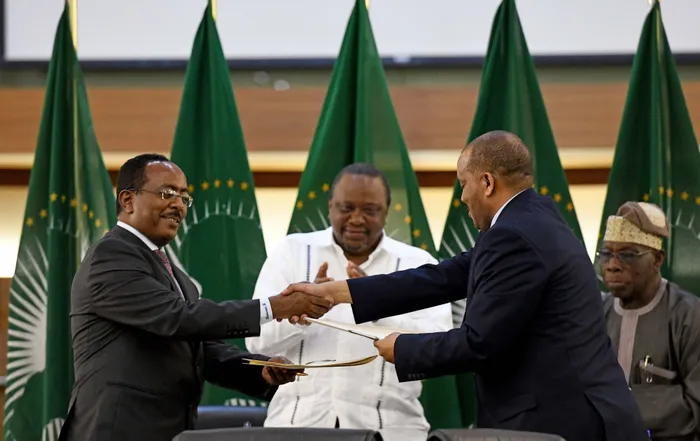While football may unite nations, unity is important for Africans too

Picture: GCIS - Former Kenyan President Uhuru Kenyatta and Nigerian President Olusegun Obasanjo look on as Ethiopian government representative Redwan Hussein and Tigray People's Liberation Front (TPLF) Getachew Reda shake hands after the signing of a peace agreement between their two respective countries in a bid to end the conflict. The agreement was signed on November 2, 2022 in Pretoria, South Africa.
Picture: REUTERS/Dylan Martinez - Cameroon's Vincent Aboubakar and teamates celebrate scoring their first goal against Brazil at the Lusail Stadium, Lusail in Qatar on December 2.
By Wesley Seale
Despite some of the controversies that have surrounded the hosting of the 2022 Soccer World Cup by Qatar, the world has once again gathered around their television sets, laptops and in the stadia to see the teams compete against each other.
South Africa had its own uniting experience during 2010 when it hosted the World Cup.
Pals pitch at pubs, fans often split families while there is general excitement about whom to support.
Yet international events do not always unite. They can also divide.
Towards the end of February this year, the international community was split almost down the middle in the fall-out of the conflict in the Ukraine. Whereas the tensions and conflict between Russia and the Ukraine had started in 2014 already, the unprecedented actions by NATO in permitting Ukraine to join it paved the way for the escalation of the conflict.
Not since the days of the Cold War has the international community been this divided.
Undoubtedly, the effect of the conflict has also had its toll on Africa.
According to Olakunle Mohammed, a writing fellow at the African Liberty, over 340 million people face food insecurity because of the conflict.
In fact, if anything, the Ukrainian conflict, for Senegalese president, Macky Sall, only highlighted the challenges faced by Africa and it is this pragmatic approach to the conflict that African leaders have taken hitherto.
Sharing the platform with President Sall at the International Forum on Peace and Security at the end of October, former Nigerian president, Mahamadou Issoufou, drew parallels in the reporting by the media between the conflict in Ukraine and the conflicts which continue to happen on the African continent.
The African leaders therefore sketched to their audience what was really happening in each country across the globe. Africans and other countries in other regions have sought to address their own challenges rather than be pre-occupied in condemning Russia.


This, prioritizing domestic issues, as well as the re-alignment of countries globally has led to the interesting development of a number of countries such as Turkey, Saudi Arabia, Egypt, Iran and Argentina in applying to join BRICS (Brazil, Russia, India, China and South Africa).
The bloc has been instrumental in ensuring an alternative to western institutions that have dominated the international arena for the last seventy years. Through the establishment of instruments such as the BRICS bank as well as talks to move away from the US dollar as the currency of international trade, the group has been able to give impetus to the quest by countries in the global south and the developing world to seek alternatives.
The fact that the international community is fast hearkening back to Cold War days entices these countries to join a strategic bloc such as BRICS.
In fact, before the onset of Covid-19, the BRICS presidents had begun inviting the leaders of countries in the region, where the summit was to be hosted, to attend the BRICS summits as well.
This was a particular contribution made by South Africa when it hosted the Summit in Durban in 2013 and hosted BRICS Plus at the same time.
On 13-15 December 2022, US president Joe Biden will host African leaders for a US-Africa Leaders Summit. No doubt, it will once again be a moment where the US lobbies African countries against Russia and China.
Ostensibly, the summit is billed, according to the US department of state, as an opportunity for US to demonstrate its “enduring commitment to the African continent and to underscore the importance of US-Africa relations and increased cooperation on shared global priorities.”
Unfortunately, African researchers and scholars studying US-African relations in the last two administrations, if not longer, have soon come to realize that the US has gone back to the Cold War approach in its policy for sub-Saharan Africa.
In December 2018, John Bolton, then US national security advisor to Donald Trump, outlined that the US position and approach to Africa really had China rather than the continent in mind.
In August this year, Joe Biden’s administration released their policy towards sub-Saharan Africa and this time they wrote it with Russia in mind, rather than again the people and continent of Africa.

While football may unite, it will be important for Africans to unite especially when engaging the major powers of the globe. African leaders must be sceptical as they touch down in Washington next week for the Summit because the Americans certainly do not have their and their people’s interests at heart but that of their own. One can think of no better forum than BRICS where Africans are represented and form part of determining their own place in the international community.
Seale has a PhD in international relations and wrote his dissertation on BRICS.